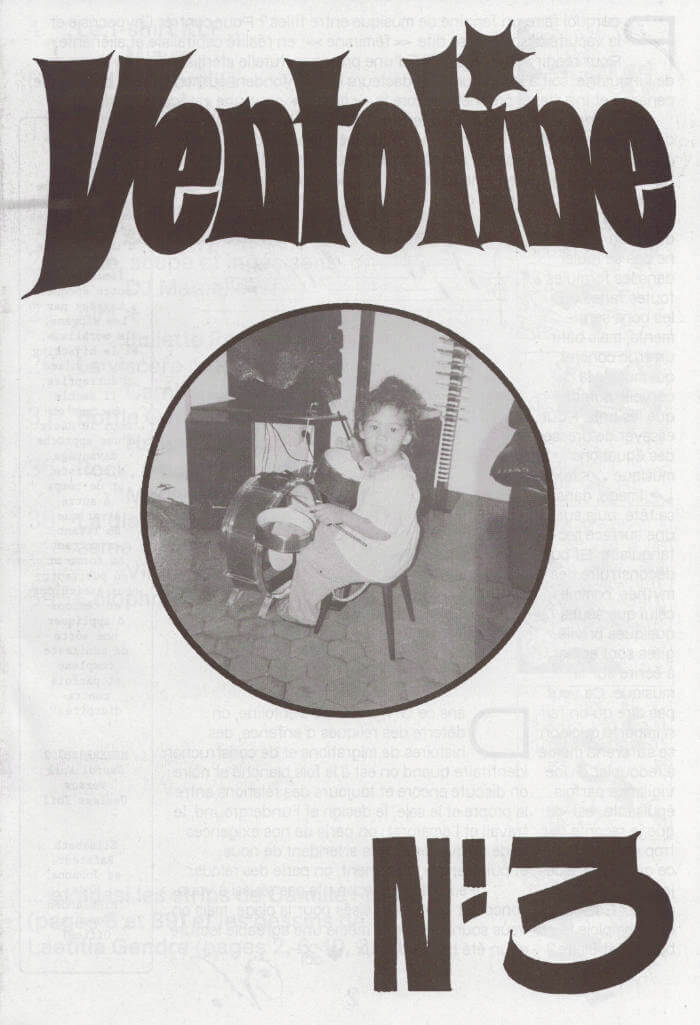
Ventoline #3 – été 2021
Pourquoi faire un fanzine de musique entre filles? Pour contrer l’hypocrisie et la vacuité d’une presse dite «féminine», en réalité capitaliste et aliénante; pour réagir soit à l’insipidité d’une presse culturelle stérilisée par les discours de l’industrie, soit à la morgue de rédacteurs qui confondent authenticité et beaufitude, panache et insulte, et prennent encore la «meuf» pour une catégorie musicale.
Pour se rencontrer physiquement ou virtuellement, soulever des cailloux ensemble, échanger nos habits, éclairer les doutes autant que les évidences, se sentir moins seules. Pour se sortir un peu d’un flux digital qui nous rend malades, s’affranchir des likes, tanguer entre passé et futur (c’est quoi l’«actualité»? ça commence quand, ça finit quand?). Pour ne pas se rouler dans les formules toutes faites ou les bons sentiments, mais bâtir un truc concret, qui muscle la cervelle autant que les bras. Pour essayer de dresser des équations musique—texte—image dans sa tête, puis dans une surface rectangulaire. Et puis déconstruire des mythes, comme celui qu’il y a des gens qui peuvent écrire sur la musique et d’autres pas. Ça veut pas dire qu’on fait n’importe quoi, on se surprend même à redoubler d’une vigilance parfois épuisante: est-ce que je raconte pas trop ma vie? Est-ce qu’on voit que je fais du second degré? Est-ce qu’emploie le bon vocabulaire?
Dans ce 3e numéro de Ventoline, on déterre des reliques d’enfance, des histoires de migrations et de construction identitaire quand on est à la fois blanche et noire; on discute encore et toujours des relations entre le propre et le sale, le design et l’underground, le travail et l’amatorat; on parle de nos exigences et de ce que les autres attendent de nous; et puis parfois, forcément, on parle des relous.
Faute de temps, on n’a pas réussi à vous concocter de mots-croisés pour la plage, mais on vous souhaite quand même une agréable lecture et un été bien moelleux.
Les contributrices :
Miaux / Mia Prce (Anvers)
miaux.bandcamp.com
Hélène Marian (Paris)
https://www.helenemarian.com
Nelly Chevaillier (Paris)
instagram.com/nllchvllr
Anne Vimeux (Marseille)
http://sissi-club.com
Inès Di Folco
instagram.com/inesdifolco
rosemercieband.bandcamp.com
http://www.red-lebanese.com/index.php/music/mi-nina-ep—pira-pora/
Camille Foucou (Marseille)
instagram.com/camillefoucou
Juliette Romero
instagram.com/julietteromeroaaa
Camille Lavaud (Paris / Dordogne)
camillelavaud.com
Hélène Barbier
helenebarbier.bandcamp.com
celluloidlunch.com
Marie-Pierre Bonniol (Berlin)
studiowalter.com
julietippex.com
Victoria Palacios (Bruxelles)
instagram.com/victoriapalacios
Camille Potte (Marseille)
camillepotte.fr
Laetitia Gendre (Bruxelles)
laetitiagendre.com
DJ Marcelle (Amsterdam)
anothernicemess.com




